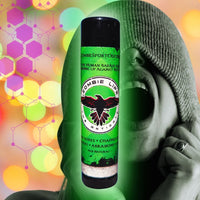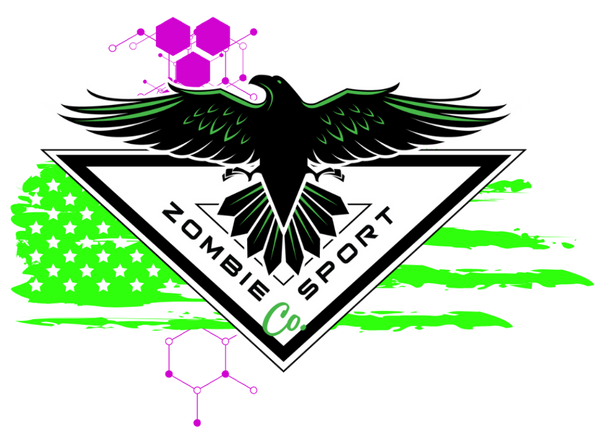At Zombie Sport, we harness the power of nature to provide effective relief and speedy healing for cold sores. Our carefully curated blend of ingredients works on multiple levels:
-
Active Protection Against Viruses: Our formula includes Tea Tree Oil and Eucalyptus Oil, which have scientifically proven antiviral and antibacterial properties. These ingredients work together to combat the herpes virus, minimizing the duration and severity of outbreaks.
-
Calm and Cool: With Peppermint Oil and Lavender Oil, our formula provides a soothing sensation that calms irritation. These essential oils help alleviate discomfort and promote relaxation, making it easier to cope with the irritating symptoms of a cold sore.
-
Nourishment and Regeneration: The combination of Shea Butter, Coconut Oil, and Vitamin E Oil hydrates and nourishes the skin, ensuring it remains healthy and facilitates faster healing. Research has shown that Vitamin E accelerates skin regeneration, while Shea Butter and Coconut Oil provide deep moisturization.
-
Natural Barrier: Beeswax creates a protective layer over the affected area, preventing environmental factors from exacerbating the cold sore. This barrier allows the skin to breathe while keeping harmful pathogens out.
-
Encapsulated Healing: The unique inclusion of Helichrysum Oil facilitates cellular regeneration, promoting quicker recovery from the blistering stage of a cold sore. It also helps to reduce inflammation, making your recovery more comfortable.
When your face feels like it's falling off.
Cold sores, chapped lips, blisters, abrasions, and life in the 21st century. Our all-natural lip care is built to fight. We're not your mother's cold sore balm.
We are not yesterdays, “Well it helped.” We are today's...
“I can't believe this actually worked. I began to get a tingle on my lip. I started using Zombie, and nothing ever grew. I'm almost in tears. Thank you.” Devon K.
Our recommendation in usage for lips is 3 applications minimally, 3 times a day, until the lip is healed.
We are only able to ship within the United States.
Below is an introduction to the differences between HSV-1 & HSV-2.
- READER BE AWARE EXPLICIT READING BELOW -
Herpes Simplex Virus type 1 (HSV-1) and Herpes Simplex Virus type 2 (HSV-2) are closely related viruses in the herpesvirus family. While they share many similarities, there are important scientific and clinical distinctions.
Genetic Differences
- HSV-1 and HSV-2 are about 50% genetically identical.
- Each has a distinct genome sequence. HSV-1 is genetically more variable.
- Several proteins and antigens differ slightly, which allows laboratory tests (like viral PCR and type-specific serology) to distinguish between the two.
- HSV-1 and HSV-2 are genetically related viruses with differences in their preferred locations, routes of transmission, clinical symptoms, and recurrence rates. Both are lifelong infections with similar mechanisms, but they differ in epidemiology, clinical relevance.
1. Antiviral Activity
-
Lab studies (in vitro): Several studies have shown that tea tree oil and its main components (such as terpinen-4-ol) display direct antiviral activity against both HSV-1.
- Mode of action: Tea tree oil appears to disrupt the viral envelope (the outer layer of the herpes virus), making it less able to infect cells.
- Some research suggests it may also block viral entry into cells or interfere with viral replication.
2. Anti-inflammatory Effect
- Tea tree oil has anti-inflammatory effects. When applied topically, it may help reduce the redness, pain, and swelling associated with herpes sores—making symptoms less severe.
3. Promotion of Healing
- By reducing the viral load and secondary bacterial infection, tea tree oil may promote faster healing of herpes lesions.
Cautions and Limitations
- NOT A CURE: Tea tree oil does not "clear" or eradicate HSV from the body. It may help with local symptoms, but cannot eliminate the virus, which remains dormant in nerve cells.
- Potential Side Effects: Tea tree oil—especially if undiluted—can cause skin irritation, allergic reactions, or dermatitis.
- Concentration Matters: Pure tea tree oil may be too strong for mucous membranes and should be diluted (often in a carrier oil).
- Not FDA-approved: Tea tree oil is not an approved therapy for herpes by medical authorities.
Summary Table
| Property | Effect on HSV-1/HSV-2 |
|---|---|
| Antiviral | Disrupts viral envelope to reduce infectivity |
| Anti-inflammatory | Reduces local redness, swelling, pain |
| Healing | May promote faster lesion resolution |
| Eradication | Does NOT kill virus inside the body |
1. Tropism (Preferred Site of Infection)
- HSV-1: Primarily infects the oral region (causing cold sores, orolabial herpes), but can also cause genital herpes.
- HSV-2: Primarily infects the genital area (causing genital herpes), but rarely causes oral infections.
2. Transmission
- HSV-1: Usually spread by nonsexual contact—kissing, sharing utensils, etc.
- HSV-2: Primarily spread by sexual contact.
3. Latency and Recurrence
- Both viruses establish latency in sensory nerve ganglia.
- HSV-1: Latency usually in the trigeminal ganglia (facial nerves).
- HSV-2: Latency usually in the sacral ganglia (lower back/genital area nerves).
- Recurrences: HSV-2 tends to recur more frequently in the genital area when compared to genital HSV-1 infections.
Summary Table
| Feature | HSV-1 | HSV-2 |
|---|---|---|
| Genome | ~50% identity w/ HSV-2 | |
| Usual location | Oral/labial, sometimes genital | Genital, rarely oral |
| Latency site | Trigeminal ganglia | Sacral ganglia |
| Recurrence | Less frequent (oral); rare genital | More frequent in genital region |
| Transmission | Saliva, oral contact | Sexual contact |
| Main diseases | Cold sores, encephalitis | Genital herpes, neonatal herpes |
In Summary:
Tea tree oil may help reduce symptoms and possibly shorten the duration of HSV-1 outbreaks when applied topically, likely due to its antiviral and anti-inflammatory properties. However, it does not clear the virus from the body, and high-quality clinical evidence in humans is limited. Always consult a healthcare professional before using tea tree oil for herpes lesions, and never apply undiluted oil to sensitive skin.
Supporting Scientific Evidence
- In vitro experiments: There is evidence from cell culture studies that tea tree oil can reduce the infectivity of HSV-1 and HSV-2 ([Carson 2001], [Schnitzler 2001]). These studies show a dose-dependent reduction in viral titers.
- Case reports and anecdotal evidence: Some individuals report symptom relief and faster healing with diluted tea tree oil applied to herpes sores.
References
- Schnitzler, P., Koch, C., & Reichling, J. (2001). Susceptibility of drug-resistant clinical herpes simplex virus type 1 strains to essential oils of ginger, thyme, hyssop, and sandalwood. Antimicrobial Agents and Chemotherapy.
- Carson, C.F., Hammer, K.A., & Riley, T.V. (2006). Melaleuca alternifolia (Tea Tree) Oil: a Review of Antimicrobial and Other Medicinal Properties. Clinical Microbiology Reviews.
Our recommendation in usage for wounds is 3 applications, 3 times a day until the wound is healed.
Once you place your order we get in the lab and get building. It takes between 5 and 13 days from order.






